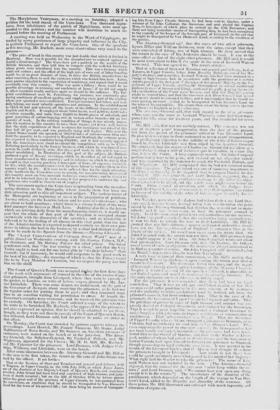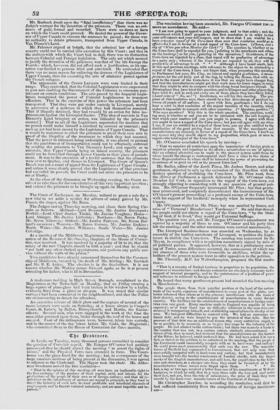The Court of Queen's Bench was occupied ailing the first
three days et the week with arguments of counsel in the case of the twelve Cana- dian prisoners, brought from Liverpool, where they were in custody of the gaoler, to London, on writs of loo'n.as corpus, granted by Mr. Just- lice Littledale. There was some demur, we understund, on the part ot the Governor of Newgate about receiving the prisoners, as he bad not the regular order for putting them in gaol ; and they remained some time lit an omnibus waiting for permission to enter. At length the Coverhor's scruples were overcome, and he received the prisoners into his custody. On Saturday, the Court ordered a copy of the return to the writs to be furnished Mr. Roebuck, who appeered for the prisoners ; and also expressed an opinion that he shmdd Jr admitted to see thym, though, as they were not then in custody of the Court of Queen's Bench, that tribunal, Lord Deuman said, had no power to make an order so that enact.
Ou Monday, the Court was crowded by persons eager to witness the proceedings. Lord llowirk, Mr. Poulett Thomson. Mr. !fume, Judga Ilalliburton of Nova Scotia. and Mr. Sumner. an A nwrican advocate of eminence, were seated on the bench or in the jury-box. The Attor- ney-General, the Solicitor-General, Sir Frederick Pollock, and Mr. Wightinan, appeared for the Crown ; Mr. M. 1). hill Mr. Roeletek. and Mr. Falconer for the prisoners. Lord Detn»an, with Judges Cole- ridge, Williams, aud Littledale, were on the bench.
After some discussion between the Attorney-General and Mr. Hill as to the ease to be first taken, the return in the case of John Grant was read by the officer. It set forth--
That at the Sessions of Oyer and Terminer and general gaol delivery, held at Niagara, in Upper Canada, on the 18th July 1 838, at which (Tunas Jones, one of the Justices of her Majesty's Court of Queen's Bench, and associates presided, John Grant hait been tried and convicted of high treason, and judg- 'non of death recorded; but on the 22d of October 183S, by letters patent under the great seal of the province of Upper Canada, he was pardoned from the conviction, on condition that he should be tninsported to Vin. Diemen's Land for the term of his natural life; but there being 110 means of transport- ing him from Upper Canada thereto, he haul been sent to Quebec, under a warrant of Sir John Colborne, the Governor, and sent aboard the Captain Ross, to Liverpool; at which ploce he arrived on the 17th December; said there not being immediate means of transporting him, he had been comulitted to the custody of timekeeper of' the borough gaol of Liverpool. to the end that he might be transported to Van l/iemen's Laud, according to the condition of the pardon.
The Attorney-General said, that the eases of two other prisoners, Lynes Miller and \Villimu liohinsou, were the same, except that they were convicted of felony, not of high treasou. Ile then moved that the return its the case of lra Aoderson should be read. It was to the same effect as that of the eight other prisoners. Sir. Hill said, it would be most convenient to him if the leture in the case of Leoreird Watson were read. This was agreed to. 'law return stated— That at a Sesiion of layer and Tenniuer and generabgaol delivery, heid at Toronto, in Upper Canada, before john Beverley Robinson, one of her Ma- jesty's JuaticeF, and associates, 1.conard Watson, %vim had been araigned on a charge of high treason, had, iii uceinuht'.nre with the provirions of a certain statute, passed in the first year the reign of her present :11itj,4■, hy theI e- gislat ore of [Kier Camillo, tle• Government to exi end conditional pardoes in alas of treason and felony, confessed his gailt, :lig t he lie nt] con:ideratioa of' the Court upon his cata.., mat that her :11a.;„..0■,'„.. Firma might be granted him; and that tlw t ii ,orselest Privy Coutte:t had atfreed that mercy should he extended to him ; and it W/IAndjuilget! that he should re- ceive pardon, on couch i .11 that he be t nmsport ed. to Van Likaiell's Land for the term of Ili8 natural life. Tla.- let tun then set out his being scot to Quebec, and thence to England, as in i Is oilier easr .
l'he norney-tiencral said. that with regard to the nItte prisouers whose case Willi the same as Leonard IVatson's, some had been trans- portel air life, some l'ur fourteen years, and this remainder for seven years. alr. that was not entirely correct. TImeseinsinee was not oae of fimarteen years' trausportation aeon time date of the pardon, lett front the pee mod of the prisoners' arrival in Vim Diemen's Laud. Su oleo with relerence to those sentenceil to seven y4:i1113' transportation.
A. prelimieary clam:tab», to the validity of the writs of habeas corpus issued. by .1mbiett 1.ittledale was then urged by the A aurney-General. Ile u 1lim...tea. that the sot e of Charles time Second did tita allow of a
fling a Writ of teeeas ii eaus in vacation, in a case like
I hat it.. tit.. Court. A lona iiitgull:mit ensued. Sir John C.:mamba perti,ua :mu iy kept to his poina and iiisisced on toe objection raised; and was i,taiporied by the Solieitor-tienyral, Sir Frederick. Pollock, and air. Itlieliaean. ilia complained that he bad not received uotice of this I i, ;Jul?. 1.0i at raised was one of' immense importance to the libera- id' the lie required time to Ill., us hitasv if for dis- ae...inr it i : ''5 grouted; and Lord INainein eieseested, that in
re. :steel lithe eerty eutild eon, t time Otilur tills Ottiee-
C.O.IS I:ill:..la 1,, 1 snd this A', imh: eitse illight COMO 1,CfOrt: the eral obiervatinns will. .lie Judges in. (2:- rupted the t'rky.,-n it WT.: ti.:!' OpilliOTI mats rather in tilt our of the varalit:. the writs or
Littleditie.
On 'Ittesday, so, n1 atter ti' Jraleas had teisen their seats.. Lord. Den- man suit ad, thtu i 1 Coort, having taken into e,,nFid,-Tation the point; raised by the Aitorney-General, hest decided tin., it eisild nut be main- tained ; am td. it Wa.• 117!11(.0?S,111.y to hear the prisoners' counsel in reply. Lord I 1-..ntan cited preateleitts atIll authorities for this decisiom Sir :John 1.,,marked, that the authorities being color:Mit:owe, It was Ili: thay t•t stile:lit the case to 1.ordships. :11r, I Ii I I 1-1.- gretted tilt anyiii ¶bt dilfutem.e anoteg antiguated authorities should. have led lib: of England ea ettenipt a blow tit *he liherty of tile sitijete. I le mvitiiid now move 110/11 the return filed. Sir Jelin Campbell said, the return was not filed. alr. I I it I presiini,s1 that be might suppose it to he filets. Sir John Cemplteil would not allow that Feeitioption. Lord Deontan said, titer alr. 1 hethry, the oilicer, never heard of )-.nel) sit tu1jetioli : the retura e,as eloveye understioal to be filed as a I:latter or course. Sir John Campbell still demurred abut the Bench ?aim; itgallist him, lie Was fore el to submit.
A. %'V IS biog. a t.,;tinielit then commenced, on Mr. llilfs motion that " Leonard Wetstei be diseltarl,ti, opoli the return now filed Ot record in this c.1,1rt.- The diseiu -siol. is ii day,. awl the report of it OCISIIIAC-; In it)' eliseely-prieted collo-tea of the .iteetioy ( area's /a Ts, give a •t latch :e,:;lLE of the sp' li.s .'sla seed, is impossible in
war limited enil wou'd Ite moreover ioodiarabis tiresome. But
the main aiT:itinenh: on 1,, 1si(1,,; s' med.
For the prisoners it ass see:elided. that dii re bad been no liseal conviction. That it sea: mi iii ;tea estel lislied maxim ()I law tiest no man conk( sillier punislimeet "ty l.'s own 'tote ent, or by contract ; and the authority me halite pmiisninvitt must derived. not from the prisoner's emisclit, but from undouttoul I:1 w. That in the ellf,0 of his prisoners, the t ea:erten. of Upper c ids lii no. such autbority. Thans the priviltese of portion in eases of hisdi tratson pail murder Was tsX.- pressly to Colonial Governors. eiel retained for the SO\
That it )1 teist be most Mondale to eitetower a Colonial Governor to make bargal :s with to e. 11,1,n■ it commutation of Mr. Roebuck dwelt upon the "fatal insufficiency" that there,was•no Judge's warrant for the detention of the prisoners. There was no, evie dence of guilt, formal and recorded. There were no:dates-or bets on which the Court could proceed.. He denied the power of the Gover- nor of Upper Canada to execute the sentence he passed ; for there was no authority to detain prisoners, transported from Upper Canada,- in Van Diemen's Land.
Mr. Falconer argued at lettgth, that the criminal law of a foreign country could not be carried into execution by this Court ; and that in the matters with -which the Court had to deal, there was no distinction between Colonial and Foreign legislation. The only act which seemed to justify the detention of the prisoners, was that of the 5th George the Fourth ; which, however, did not afford such a justification as its Ope- ration was limited to persons tried and convicted. He 'contended that there was nohnore reason for enforcing the decrees of the Legislature of Upper Canada, than for executing the acts of attainder passed against the French refugees. The arguments of the Crown Lawyers were very limited in their range. They contended, that the Colonial Legislatures were empowered to pass acts enabling the Government of the Colonies to commute pun- ishment on certain. conditions. The acts passed by the Impnrial Legis- lature recognized the power of Colonial Legislatures to transport offenders. That in the exercise of this power the prisoners had been transported. That they were - put under custody in Liverpool, merely in pursuance of a sentence to which they had themselves assented. That if illegally detained, they had remedy by an action for false im- prisonment against the Liverpool Gaoler. [The idea of convicts in Van Diemen's Land bringing an action, was ridiculed by the prisoner's counsel.] That an act of the Legislature superseded the doctrine that no person could make himself a criminal by consent or contract ; and such an act had been passed by the Legislature of Upper Canada. That -it would he monstrous to allow the prisoners to plead their own acts in proof of the illegality of the treatment to which they had assented. That the power to transport being undeniable, it was absurd to pretend that the punishment of transportation could not be effectually enforced by sending the prisoners to Van Diemen's Land ; and equally so to maintain, that Upper Canada being an inland country, the prisoners cOuld not be forwarded through Lower Canada to their place of punish- ment. It was in the execution of a lawful sentence that the prisoners were sent to Quebec, end thence to Liverpool. The Court of Queen's Bench was not a court of appeal from the Legislature of Upper Canada ; and unless it were clearly proved that the Legislature of that province had exceeded its powers, the Court could not order the prisoners to be set at liberty.
At the close of the discussion on Wednesday evening, the Court re- solved to take time for the consideration of this very important question ; and ordered the prisoners to be brought up again on Monday next.



























 Previous page
Previous page